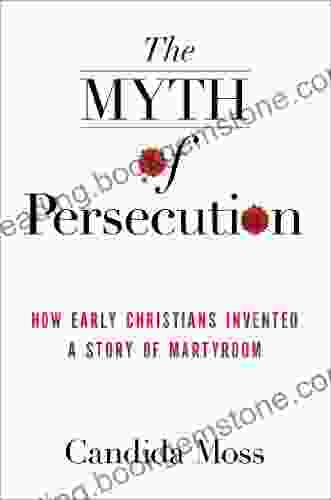The Myth of Persecution: Uncovering the Truth About Religious Freedom in America

:
The narrative of religious persecution against Christians in America has gained significant traction in recent years. This narrative often portrays Christians as victims of widespread discrimination and oppression, facing restrictions on their religious practices and beliefs. However, a closer examination of the reality of religious freedom in the United States reveals a far more complex and nuanced picture. This article aims to debunk the myth of persecution and uncover the truth about religious freedom in America.
4.3 out of 5
| Language | : | English |
| File size | : | 608 KB |
| Text-to-Speech | : | Enabled |
| Screen Reader | : | Supported |
| Enhanced typesetting | : | Enabled |
| Word Wise | : | Enabled |
| Print length | : | 323 pages |
Historical Context:
The First Amendment to the U.S. Constitution, adopted in 1791, guarantees the free exercise of religion and prohibits the government from establishing an official religion. This enshrined religious freedom as a fundamental right and laid the foundation for a pluralistic society. However, it is important to acknowledge that the interpretation and application of the First Amendment have evolved over time, reflecting societal shifts and changing understandings of religious freedom.
Legal Protections:
The United States has a robust legal framework that protects religious freedom. The Religious Freedom Restoration Act (RFRA),enacted in 1993, prohibits the government from imposing substantial burdens on religious exercise unless it has a compelling interest and uses the least restrictive means to achieve that interest. This law has been instrumental in safeguarding the religious rights of individuals and organizations.
In addition to RFRA, numerous other laws and court rulings provide further protection for religious freedom. For instance, the Equal Access Act ensures that religious student groups have equal access to public school facilities. The Religious Land Use and Institutionalized Persons Act protects the religious rights of prisoners and other institutionalized individuals.
Social Dynamics:
While legal protections are crucial, social dynamics also play a significant role in shaping religious freedom. In a diverse nation like the United States, with people from various religious backgrounds, tensions and conflicts can occasionally arise. However, it is essential to distinguish between genuine persecution and isolated incidents of prejudice or discrimination.
Isolated incidents of bias or hostility do not constitute systemic persecution. Religious freedom thrives in a society where individuals are free to practice their faith openly and without fear, but it also requires mutual respect and tolerance among different religious groups.
Misconceptions and Misinterpretations:
The narrative of Christian persecution in America often relies on misconceptions and misinterpretations. For example, some argue that laws prohibiting religious discrimination in public places, such as schools and workplaces, infringe upon their freedom to express their religious beliefs. However, these laws aim to ensure that all individuals have an equal opportunity to participate in society, regardless of their religious beliefs.
Another misconception is the claim that the separation of church and state means that religion has no place in public life. On the contrary, the First Amendment allows for the free exercise of religion in public spaces, as long as it does not violate the rights of others. Religious organizations can participate in political discourse, advocate for their beliefs, and engage with society in various ways.
:
The myth of persecution against Christians in America is a distorted and exaggerated narrative that does not accurately reflect the reality of religious freedom in the United States. While isolated incidents of prejudice or discrimination may occur, there is no evidence of widespread or systemic persecution. The U.S. Constitution and a robust legal framework provide strong protections for religious freedom, and the nation remains committed to the principles of pluralism and tolerance.
It is crucial to foster a more accurate understanding of religious freedom and recognize the importance of mutual respect and dialogue among different religious groups. By debunking the myth of persecution and promoting a balanced perspective, we can strengthen the foundations of religious freedom in America and create a society where all individuals can freely practice their faith.
4.3 out of 5
| Language | : | English |
| File size | : | 608 KB |
| Text-to-Speech | : | Enabled |
| Screen Reader | : | Supported |
| Enhanced typesetting | : | Enabled |
| Word Wise | : | Enabled |
| Print length | : | 323 pages |
Do you want to contribute by writing guest posts on this blog?
Please contact us and send us a resume of previous articles that you have written.
 Best Book
Best Book Page Flip
Page Flip Bookshelf
Bookshelf Literary loom
Literary loom Chapter
Chapter Bookish
Bookish PageTurner
PageTurner Bibliophile
Bibliophile Story
Story Inkwell
Inkwell Bookworm
Bookworm Labyrinth
Labyrinth Plot Twist
Plot Twist Prose
Prose Paperback
Paperback Storyteller
Storyteller Sanctuary
Sanctuary Fiction
Fiction Reading
Reading Chronicle
Chronicle Read
Read Patrick J Flannigan
Patrick J Flannigan Gerald L Kooyman
Gerald L Kooyman Lauren D Schmalz
Lauren D Schmalz Fiona Maccarthy
Fiona Maccarthy Alan Laycock
Alan Laycock Hob Osterlund
Hob Osterlund Peter Samuel
Peter Samuel Al Sharpton
Al Sharpton Robert Arp
Robert Arp Gay Talese
Gay Talese Simon Callow
Simon Callow Brien Foerster
Brien Foerster Fluent In Korean
Fluent In Korean Malka Older
Malka Older Glyn Macey
Glyn Macey Adeline Lim
Adeline Lim Barbara Brownie
Barbara Brownie Albert Samaha
Albert Samaha Sarah Ferguson
Sarah Ferguson Judith M Heimann
Judith M Heimann Gail Pool
Gail Pool Michele Bousquet
Michele Bousquet Jean Pederson
Jean Pederson Lynsey Addario
Lynsey Addario Samantha Downing
Samantha Downing Frances Kai Hwa Wang
Frances Kai Hwa Wang Julian Bell
Julian Bell N Dia Rae
N Dia Rae Kazuaki Tanahashi
Kazuaki Tanahashi Winifred Brown
Winifred Brown Rosa Park
Rosa Park Jessica Lee
Jessica Lee Randy Palmer
Randy Palmer Robin Meloy Goldsby
Robin Meloy Goldsby Smashing Magazine
Smashing Magazine Cecil Jenkins
Cecil Jenkins Joseph Campbell
Joseph Campbell St Paul S Greek Orthodox Church
St Paul S Greek Orthodox Church Alastair Vere Nicoll
Alastair Vere Nicoll Laurie Schneider Adams
Laurie Schneider Adams Sherry Turkle
Sherry Turkle Rob Stone
Rob Stone Aimee Alexander
Aimee Alexander Aleksandr Solzhenitsyn
Aleksandr Solzhenitsyn A R Corbin
A R Corbin Belinda Smith Cicarella
Belinda Smith Cicarella David Morrell
David Morrell Peter Warner
Peter Warner Paul Clark
Paul Clark Michael J Fox
Michael J Fox Alex White
Alex White Chimamanda Ngozi Adichie
Chimamanda Ngozi Adichie Lee Goldberg
Lee Goldberg E C Godhand
E C Godhand Michael Reyes
Michael Reyes Peter Gethers
Peter Gethers Kimiko Kitani
Kimiko Kitani Aileen Bordman
Aileen Bordman Massoud Hayoun
Massoud Hayoun Bernard Diederich
Bernard Diederich Karl Beecher
Karl Beecher Charles De Lint
Charles De Lint 1st Edition Kindle Edition
1st Edition Kindle Edition Katie Daisy
Katie Daisy Paul Hallas
Paul Hallas Jennifer Sewing
Jennifer Sewing Matt Ortile
Matt Ortile Elizabeth Mcpherson
Elizabeth Mcpherson Herman Wouk
Herman Wouk Alecia J
Alecia J Robyn Blakeman
Robyn Blakeman Geronimo
Geronimo Alex Berenson
Alex Berenson Alex Dudok De Wit
Alex Dudok De Wit John Ingledew
John Ingledew Sarah Polley
Sarah Polley Alex Albrinck
Alex Albrinck Alejandro Jodorowsky
Alejandro Jodorowsky Alex Hibbert
Alex Hibbert Aimee Nezhukumatathil
Aimee Nezhukumatathil Alex Tannen
Alex Tannen Katja Schmitt
Katja Schmitt Tom Wood
Tom Wood Paul J Pastor
Paul J Pastor Lavonne Mueller
Lavonne Mueller Jessica Fanigliulo
Jessica Fanigliulo Saleem H Ali
Saleem H Ali Mary Ann Shaffer
Mary Ann Shaffer Ed Miller
Ed Miller Franklyn Griffiths
Franklyn Griffiths Jack Jewers
Jack Jewers Alex Kava
Alex Kava Philip Norman
Philip Norman William Gaskill
William Gaskill Sean Hall
Sean Hall Aleksandar Hemon
Aleksandar Hemon Dale Olausen
Dale Olausen Misba
Misba Hans Keilson
Hans Keilson Julian Hoxter
Julian Hoxter Eileen Sorg
Eileen Sorg Cynthia D Yoder
Cynthia D Yoder Adele Wagstaff
Adele Wagstaff Tod Benoit
Tod Benoit Gareth C Meadows
Gareth C Meadows Colette Pitcher
Colette Pitcher Ted Okuda
Ted Okuda Al Davidson
Al Davidson Cassia Cogger
Cassia Cogger Adrienne Keene
Adrienne Keene Andrew Solomon
Andrew Solomon Fanny Kelly
Fanny Kelly Terez Mertes Rose
Terez Mertes Rose Hayley Mills
Hayley Mills Ricardo Victoria
Ricardo Victoria Eliane Strosberg
Eliane Strosberg Sarah Spencer
Sarah Spencer Greg Jenkins
Greg Jenkins Mark Panek
Mark Panek Daniel Kay Hertz
Daniel Kay Hertz Masahiro Kasahara
Masahiro Kasahara Abdulrazak Gurnah
Abdulrazak Gurnah Aer Ki Jyr
Aer Ki Jyr Tracy Michaud
Tracy Michaud Markus S Agerer
Markus S Agerer Heather Hutchison
Heather Hutchison John Varley
John Varley Alan Colquhoun
Alan Colquhoun Amy Latta
Amy Latta Haroon Moghul
Haroon Moghul C M Carney
C M Carney My Daily Spanish
My Daily Spanish John Maloof
John Maloof Gary Zacny
Gary Zacny Akira Kurosawa
Akira Kurosawa Mary Monroe
Mary Monroe Elizabeth Holmes
Elizabeth Holmes Mark William Shaw
Mark William Shaw Al Saadiq Banks
Al Saadiq Banks Tamara Thiessen
Tamara Thiessen Paul Curry
Paul Curry Emilie Conrad Da Oud
Emilie Conrad Da Oud Bobby Love
Bobby Love Aleksandar Nedeljkovic
Aleksandar Nedeljkovic Roger Bennett
Roger Bennett Alastair Reynolds
Alastair Reynolds Giovanni Iannoni
Giovanni Iannoni Eric Sprinkle
Eric Sprinkle Martin Edge
Martin Edge Seth Kugel
Seth Kugel Thomas Geve
Thomas Geve Anne Glenconner
Anne Glenconner Rachael Cerrotti
Rachael Cerrotti Rudy Rucker
Rudy Rucker Garret Romaine
Garret Romaine Margaret Shepherd
Margaret Shepherd Siddharth Anbalagan
Siddharth Anbalagan A J Verdelle
A J Verdelle Lama Rod Owens
Lama Rod Owens Alex Jennings
Alex Jennings Richard Poulin
Richard Poulin Christopher P Jones
Christopher P Jones Jesse Wente
Jesse Wente George Bernard Shaw
George Bernard Shaw Anthony Doerr
Anthony Doerr William Golding
William Golding Bob Rohm
Bob Rohm Allison Moore
Allison Moore Osman Yousefzada
Osman Yousefzada Tupac Shakur
Tupac Shakur Alain Kerzoncuf
Alain Kerzoncuf Jennifer Egan
Jennifer Egan Nicolas Sellens
Nicolas Sellens George Smith
George Smith Alex Robinson
Alex Robinson Michael Booth
Michael Booth Jeffrey Spivak
Jeffrey Spivak F Sehnaz Bac
F Sehnaz Bac Russell Staiff
Russell Staiff C N Phillips
C N Phillips Laurieann Gibson
Laurieann Gibson Alan Bachmann
Alan Bachmann Agatha Christie
Agatha Christie Beth Alison Maloney
Beth Alison Maloney Alex Kerr
Alex Kerr Robert M Kerns
Robert M Kerns Tyler Green
Tyler Green Ann Mah
Ann Mah S Elizabeth
S Elizabeth Bill Dixon
Bill Dixon Aleron Kong
Aleron Kong Stephen Bodio
Stephen Bodio Reshonda Tate Billingsley
Reshonda Tate Billingsley Magunta Dayakar
Magunta Dayakar Craig Johnson
Craig Johnson Dominique Dupuy
Dominique Dupuy Jennifer Lilya
Jennifer Lilya John Perrier
John Perrier Alicia Drake
Alicia Drake Adrian Tchaikovsky
Adrian Tchaikovsky Alejandro Zambrano Sevillano
Alejandro Zambrano Sevillano Akiko Busch
Akiko Busch Ramy Vance
Ramy Vance George Monbiot
George Monbiot Max Eisen
Max Eisen James S A Corey
James S A Corey Anne Vipond
Anne Vipond Michael Sayman
Michael Sayman Amanda Gorman
Amanda Gorman Eddie R Hicks
Eddie R Hicks Richard F Weyand
Richard F Weyand Tom Swimm
Tom Swimm J Pal
J Pal Luke F D Marsden
Luke F D Marsden Erika Hecht
Erika Hecht Adrien Gombeaud
Adrien Gombeaud Evanna Lynch
Evanna Lynch Alex Moore
Alex Moore Harlow Robinson
Harlow Robinson Martin Mosebach
Martin Mosebach A J Liebling
A J Liebling Anne Macleod
Anne Macleod Ella Blake
Ella Blake Eden Dawn
Eden Dawn Geninne Zlatkis
Geninne Zlatkis Charles Mccormac
Charles Mccormac Alan Sanders
Alan Sanders Charles Chipiez
Charles Chipiez Vinny Sagoo
Vinny Sagoo L Loren
L Loren Don Yaeger
Don Yaeger Alastair Campbell
Alastair Campbell Laurie Birnsteel
Laurie Birnsteel 3rd Edition Kindle Edition
3rd Edition Kindle Edition Susan Evenson
Susan Evenson Richard Lloyd Parry
Richard Lloyd Parry Mariusz Krukowski
Mariusz Krukowski Richard Ayoade
Richard Ayoade Keisha Ervin
Keisha Ervin Stuart Thornton
Stuart Thornton Roberto Lovato
Roberto Lovato J D Adams
J D Adams Lawrence F Lihosit
Lawrence F Lihosit Harold Holzer
Harold Holzer Marco Livingstone
Marco Livingstone Alfons Kaiser
Alfons Kaiser Alan M Davis
Alan M Davis Andy Steves
Andy Steves Alan Veale
Alan Veale Robert Byron
Robert Byron Viola Shipman
Viola Shipman Harry Thurston
Harry Thurston Mia P Manansala
Mia P Manansala Paula Marantz Cohen
Paula Marantz Cohen Alex Grey
Alex Grey Joseph Kim
Joseph Kim Joan Druett
Joan Druett Diane Mierzwik
Diane Mierzwik Ajax Lygan
Ajax Lygan Kerry Trout
Kerry Trout Dave Cornthwaite
Dave Cornthwaite Wes Mcdowell
Wes Mcdowell Alex Tizon
Alex Tizon Antony Sher
Antony Sher Nikolaus Julius Weichselbaumer
Nikolaus Julius Weichselbaumer James Willis
James Willis A K Duboff
A K Duboff Nancy Milford
Nancy Milford Alexa Martin
Alexa Martin Ninni Holmqvist
Ninni Holmqvist Tim Bonyhady
Tim Bonyhady Chloe Garner
Chloe Garner Wakefield Poole
Wakefield Poole K J Gillenwater
K J Gillenwater Tom Dunkel
Tom Dunkel Richard Doetsch
Richard Doetsch Peter Carey
Peter Carey Nancy Beiman
Nancy Beiman Julie Collins
Julie Collins Faith Hunter
Faith Hunter Edmund Morris
Edmund Morris Bart Rulon
Bart Rulon Mary Karr
Mary Karr Alex Danchev
Alex Danchev Nikki Giovanni
Nikki Giovanni Justin Monroe
Justin Monroe Roland Nyns
Roland Nyns Jack Anderson
Jack Anderson Mary Brooks Picken
Mary Brooks Picken Alan Maimon
Alan Maimon Candida R Moss
Candida R Moss Peter Burke
Peter Burke Emily Maker
Emily Maker Azalea Ellis
Azalea Ellis Sara Barnes
Sara Barnes Aisha Sabatini Sloan
Aisha Sabatini Sloan C M Muller
C M Muller Margaret Mitchell
Margaret Mitchell Matthew Reilly
Matthew Reilly Sabrina Devonshire
Sabrina Devonshire Michael Samerdyke
Michael Samerdyke Irmgard Bartenieff
Irmgard Bartenieff Kayleigh Mcenany
Kayleigh Mcenany William C Meadows
William C Meadows Dave Addey
Dave Addey Maturin Murray Ballou
Maturin Murray Ballou Brad Thor
Brad Thor Noam Oswin
Noam Oswin A D Davies
A D Davies Paul Austin
Paul Austin Bradley Wright
Bradley Wright Tom Weaver
Tom Weaver Bill Manley
Bill Manley Michael Weeks
Michael Weeks Akiva Teddy Macleod
Akiva Teddy Macleod G J Ogden
G J Ogden Ann Torrence
Ann Torrence Robert Condon
Robert Condon Christoph Brueck
Christoph Brueck Alex Gough
Alex Gough Marian Filar
Marian Filar Francis M Higman
Francis M Higman Betty Reid Soskin
Betty Reid Soskin Ella Frances Sanders
Ella Frances Sanders Huma Abedin
Huma Abedin Ben D Over
Ben D Over Danie Ware
Danie Ware J R R Tolkien
J R R Tolkien Anna M Church
Anna M Church Armond T Joyce
Armond T Joyce Lon Varnadore
Lon Varnadore Tara Ellis
Tara Ellis Albert Blasco Peris
Albert Blasco Peris Scott Bukatman
Scott Bukatman Sjeng Scheijen
Sjeng Scheijen Alexa West
Alexa West Brenda Barrett
Brenda Barrett Judy A Bernstein
Judy A Bernstein Giannalberto Bendazzi
Giannalberto Bendazzi Gregory Michie
Gregory Michie Adrian Dater
Adrian Dater R J Patterson
R J Patterson Bernard Cornwell
Bernard Cornwell Alan Jacobson
Alan Jacobson Timothy Samara
Timothy Samara V A Lewis
V A Lewis Troy Taylor
Troy Taylor Lee Craker
Lee Craker Anais Granofsky
Anais Granofsky Junheng Li
Junheng Li John French
John French Allison Pataki
Allison Pataki Matt Dickinson
Matt Dickinson Rian Hughes
Rian Hughes Living Languages
Living Languages Kirsten Weiss
Kirsten Weiss Guy Kawasaki
Guy Kawasaki Adele P Margolis
Adele P Margolis Scott Harwood
Scott Harwood Thomas Huhti
Thomas Huhti Yvvette Edwards
Yvvette Edwards Michael Connelly
Michael Connelly Veronica Sekules
Veronica Sekules Josh Golding
Josh Golding Albert Corbeto
Albert Corbeto Jack L Grossman
Jack L Grossman Rhonda K Garelick
Rhonda K Garelick Kindle Edition
Kindle Edition Ak Turner
Ak Turner Cheech Marin
Cheech Marin Ann Maclean
Ann Maclean Sarah Crafts
Sarah Crafts Alan Grainger
Alan Grainger Alex Zadeh
Alex Zadeh Alex Foster
Alex Foster Torben Landskrone
Torben Landskrone Shelli Marie
Shelli Marie Claudia Rankine
Claudia Rankine Francisco Martin Rayo
Francisco Martin Rayo Alejandra Viscarra
Alejandra Viscarra Alec Potrero
Alec Potrero Anita Friedman
Anita Friedman Peter Gray
Peter Gray Sandie Heron
Sandie Heron Jeff Lieberman
Jeff Lieberman Roxana Robinson
Roxana Robinson Rozsika Parker
Rozsika Parker Christian Cameron
Christian Cameron Robert Marshall
Robert Marshall David Conyers
David Conyers Adam Nayman
Adam Nayman Juhea Kim
Juhea Kim Afua Hirsch
Afua Hirsch Alistair Urquhart
Alistair Urquhart Fiona Humberstone
Fiona Humberstone Alberlin Torres
Alberlin Torres Grace Lees Maffei
Grace Lees Maffei Ginger Zee
Ginger Zee A J Alonzo Wind
A J Alonzo Wind Richard Hunt
Richard Hunt Aki Choklat
Aki Choklat Jim Hinckley
Jim Hinckley Aurora Levins Morales
Aurora Levins Morales Christian Stoll
Christian Stoll Dima Ghawi
Dima Ghawi Graham Mcneill
Graham Mcneill Nancy Marguerite Anderson
Nancy Marguerite Anderson Alex Kotlowitz
Alex Kotlowitz Danny Newman
Danny Newman Rich Polanco
Rich Polanco Frank Catalano
Frank Catalano D Rus
D Rus Adrien Clautrier
Adrien Clautrier Antonio Centeno
Antonio Centeno Heidi Moksnes
Heidi Moksnes Alex Hillkurtz
Alex Hillkurtz Stephen Davis
Stephen Davis Felix R Savage
Felix R Savage Alan Murphy
Alan Murphy Inman Learning
Inman Learning Herman Melville
Herman Melville Anne Thomas Soffee
Anne Thomas Soffee Rachel Mcmillan
Rachel Mcmillan D K Holmberg
D K Holmberg Soon Y Warren
Soon Y Warren Michelle Loucadoux
Michelle Loucadoux Neil Wilson
Neil Wilson Terry Barrett
Terry Barrett Ken Layne
Ken Layne Ally Morin
Ally Morin Naughty Dog
Naughty Dog Samuel R Delany
Samuel R Delany Luciano Thomazelli
Luciano Thomazelli Geert Mak
Geert Mak Despina Stratigakos
Despina Stratigakos Monica Russel
Monica Russel A E Filby
A E Filby Amanda Lawrence
Amanda Lawrence Jeanne Filler Scott
Jeanne Filler Scott P T Books
P T Books Robert Clark
Robert Clark Laurel Hart
Laurel Hart Adam Roberts
Adam Roberts Georgia Purdom
Georgia Purdom Amy Tan
Amy Tan Howexpert Press
Howexpert Press Christopher G Nuttall
Christopher G Nuttall Stuart Taylor
Stuart Taylor Tom Scocca
Tom Scocca A J Markam
A J Markam Tim Lawrence
Tim Lawrence Jane Patrick
Jane Patrick Laura Galloway
Laura Galloway John Phillip Santos
John Phillip Santos Donna Digiuseppe
Donna Digiuseppe Gregory Benford
Gregory Benford Alan Rabinowitz
Alan Rabinowitz Kelly Bowen
Kelly Bowen Arlene Croce
Arlene Croce Chip Kidd
Chip Kidd Nihon Vogue
Nihon Vogue Marco Leonel Garcia Gonzalez
Marco Leonel Garcia Gonzalez Albert Woodfox
Albert Woodfox Louise Erdrich
Louise Erdrich Mark Christopher Weber
Mark Christopher Weber Eric Goldberg
Eric Goldberg Keila Rowe
Keila Rowe Abdul El Sayed
Abdul El Sayed Jason Cordova
Jason Cordova Kim E Nielsen
Kim E Nielsen Alan Carr
Alan Carr Alan Smith
Alan Smith James Baldwin
James Baldwin Pam Cook
Pam Cook Stefan Zweig
Stefan Zweig John Gold
John Gold Charlene Tarbox
Charlene Tarbox Stefano Mancuso
Stefano Mancuso John Gonzalez
John Gonzalez Shaul Kelner
Shaul Kelner A J Diamond
A J Diamond Yahtzee Croshaw
Yahtzee Croshaw Geoff Hann
Geoff Hann Kathleen Brady
Kathleen Brady Alan Verskin
Alan Verskin Learning Through Activities
Learning Through Activities Natasha Boyd
Natasha Boyd Ivy Mix
Ivy Mix Linda Bloomfield
Linda Bloomfield Afia Atakora
Afia Atakora M Osman Siddique
M Osman Siddique Jeffery H Haskell
Jeffery H Haskell Dustin Lynx
Dustin Lynx Alex Wagner
Alex Wagner Josh Holliday
Josh Holliday Danielle Donaldson
Danielle Donaldson Cherrie Moraga
Cherrie Moraga Aeham Ahmad
Aeham Ahmad Paul Hadden
Paul Hadden Andrew Morton
Andrew Morton Ava Reid
Ava Reid Akaisha Kaderli
Akaisha Kaderli Akwaeke Emezi
Akwaeke Emezi Alda Sigmundsdottir
Alda Sigmundsdottir Matthew Bourne
Matthew Bourne Nicki Grace
Nicki Grace Rocio Carvajal
Rocio Carvajal Gerhard Haase Hindenberg
Gerhard Haase Hindenberg Michael Anderson
Michael Anderson Greg Sestero
Greg Sestero Alberto Manguel
Alberto Manguel Fadel Abuelula
Fadel Abuelula Alan Dean Foster
Alan Dean Foster Gary Jennings
Gary Jennings Ntozake Shange
Ntozake Shange Jennie Allen
Jennie Allen
Light bulbAdvertise smarter! Our strategic ad space ensures maximum exposure. Reserve your spot today!

 Yasushi InoueDiscover the Art of Crocheting Fingerless Gloves: A Comprehensive Guide to...
Yasushi InoueDiscover the Art of Crocheting Fingerless Gloves: A Comprehensive Guide to...
 Branson CarterTelenovela South of the Border: A Captivating Tale of Love, Betrayal, and...
Branson CarterTelenovela South of the Border: A Captivating Tale of Love, Betrayal, and... Neil ParkerFollow ·3.9k
Neil ParkerFollow ·3.9k Bob CooperFollow ·5.5k
Bob CooperFollow ·5.5k Roberto BolañoFollow ·5.7k
Roberto BolañoFollow ·5.7k Vladimir NabokovFollow ·7.5k
Vladimir NabokovFollow ·7.5k Richard WrightFollow ·12.1k
Richard WrightFollow ·12.1k James HayesFollow ·14k
James HayesFollow ·14k Arthur MasonFollow ·3.7k
Arthur MasonFollow ·3.7k Eugene ScottFollow ·11.8k
Eugene ScottFollow ·11.8k

 Stephen King
Stephen KingJudge This: The Unforgettable Book Covers of Chip Kidd
Chip Kidd is one of the most...

 Curtis Stewart
Curtis StewartSovereignty, Security, and Stewardship: Interwoven...
The geopolitical landscape of the 21st...

 Jay Simmons
Jay SimmonsOnly What Necessary: The Ultimate Guide to Minimalist...
Unveiling the Transformative...

 Austin Ford
Austin FordMaster Your Cricut Maker: Unleashing the Power of Design...
Embracing the Cricut...
4.3 out of 5
| Language | : | English |
| File size | : | 608 KB |
| Text-to-Speech | : | Enabled |
| Screen Reader | : | Supported |
| Enhanced typesetting | : | Enabled |
| Word Wise | : | Enabled |
| Print length | : | 323 pages |











